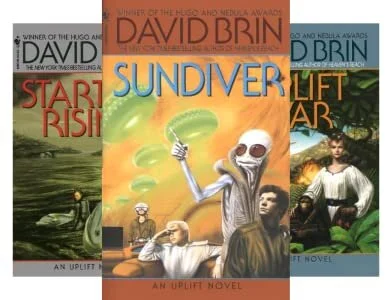The Moral Duty of Uplift (in David Brin's Sense)
In David Brin’s Uplift trilogy, “uplift” is the ancient galactic tradition of identifying species that have the potential to be transformed into intelligent species (that is, technologically sophisticated species that can, say, build spaceships), and bringing about the genetic modifications through genetic engineering and breeding needed to enable that transformation.
The Great Filter (see 1, 2) may have made us the only intelligent species in the visible universe—though if the universe is as big as standard cosmological theories suggest, the part of the universe too far away to be visible is so vast that it almost surely contains other intelligent species. But there are many species on our Earth that have the potential to be uplifted. Here are some obvious candidates:
Bonobos
Chimpanzees
Gorillas
Dolphins
Octopuses
On the relatively high intelligence of octopuses already, see Peter Godfrey-Smith’s book, Other Minds:
You also might be interested in his more recent book Metazoa. Here is a link to the Wall Street Journal review of that book.
I realize that it might offend some people’s moral sense to “play God” by tinkering with other species enough to make them as intelligent or almost as intelligent as humans are. And some may argue it is too dangerous to uplift other species, lest at some point we wind up at war with them. (The “Planet of the Apes” scenario.) Let me address these concerns.
I would frame the goal of uplift as modifying a species as little as possible subject to safety concerns and subject to getting them to a point where they can write novels and other works of art. These novels and other works of art would help us understand other beings quite different from us. To me, being able to love those who are different, as well as those who are similar to you, is the highest form of love. It is also a strength: those who can love others who are different can form broad coalitions to defend themselves against those who can only love those who are similar to themselves. Indeed, we are doing just that now in fighting the coronavirus. The coronavirus reproduces by cloning (sometimes imperfect cloning). We reproduce by mating with another, quite different human being. And we cooperate with many other human beings. Even within our bodies, there are many cells that, though genetically alike, are epigenetically different.
There is a decent argument to be made that we are not yet ready for uplift: we are still struggling to love other human beings who are different. (See, for example, my post “It Isn't OK to Be Anti-Immigrant.”) But as an optimist (see Steven Pinker’s The Better Angels of Our Nature), I have hope that at some point we will be pretty good (though never perfect) at loving all other human beings. (Here is my effort toward making economists more loving.) Allowing for the lead times needed for the science and technology of uplift, it would be great if, by the time we get pretty good at loving all other human beings, we could stretch ourselves by having other fully intelligent species to learn to love, such as uplifted bonobos, uplifted chimpanzees, uplifted gorillas, uplifted dolphins and uplifted octopuses.
I, too, am genuinely worried about conflict between humans and species we uplift. Therefore, I suggest that in addition to genetic engineering and breeding to make these other species more intelligent that we also “domesticate” them to make them nonviolent, at least toward humans. This is analogous to what humans did to transform wolves into dogs. It is also analogous to installing in robots Isaac Asimov’s First Law of Robotics: “A robot may not injure a human being or, through inaction, allow a human being to come to harm.”
As far as “playing God” goes. In my view, there is no one else available to play god but us. I believe in gods, but I am a nonsupernaturalist. Evolution of genes and memes created us. At this point in our history, within each of us is a Sage that is a god within. When we interact with one another Sage to Sage, that is a god between. Those are the most godlike things I know of. But there are also the god ahead or gods ahead that we are building, or could be building. I talk about the gods ahead in my sermon “Teleotheism and the Purpose of Life.” As a believer in gods, I think there should be more gods in the world. Uplift is a way to foster more gods within, more gods between (including from the interactions between species) and, in all probability, more possibilities for gods ahead. (As far as gods ahead are concerned, we “see through a glass darkly.”)
I’ll discuss the technology of uplift in another post at some point. Let me say only that with the brisk rate of improvement in biotechnology, I predict that uplift will be within our capabilities with technologies we’ll have within 100 years. (Notice that, since humans are already intelligent at the level we are talking about, this is more analogous to copying something already in existence than it is to creating something wholly new.) So it is worth having the ethical debate now. I am pro-uplift. I hope you are too.


